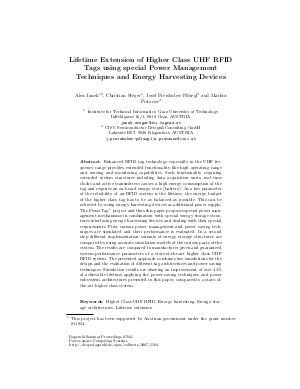Lifetime Extension of Higher Class UHF RFID Tags using special Power Management Techniques and Energy Harvesting Devices
Authors Alex Janek, Christian Steger, Josef Preishuber-Pfluegl, Markus Pistauer
-
Part of:
Volume:
Dagstuhl Seminar Proceedings, Volume 7041
Part of: Series: Dagstuhl Seminar Proceedings (DagSemProc) - License:
 Creative Commons Attribution 4.0 International license
Creative Commons Attribution 4.0 International license
- Publication Date: 2007-07-30
File

PDF
DagSemProc.07041.9.pdf
- Filesize: 0.51 MB
- 20 pages
Document Identifiers
Subject Classification
Keywords
- Higher Class UHF RFID
- Energy harvesting
- Energy storage architectures
- Lifetime extension
Metrics
- Access Statistics
-
Total Accesses (updated on a weekly basis)
0Document
0Metadata
Abstract
Enhanced RFID tag technology especially in the UHF frequency range provides extended functionality like high operating range and sensing and monitoring capabilities. Such functionality requiring extended system structures including data acquisition units, real time clocks and active transmitters causes a high energy consumption of the tag and requires an on board energy store (battery). As a key parameter of the reliability of an RFID system is the lifetime, the energy budget of the higher class tag has to be as balanced as possible. This can be achieved by using energy harvesting devices as additional power supply. The PowerTag project and thus this paper proposes special power management mechanisms in combination with special energy storage structures interfacing energy harvesting devices and dealing with their special requirements. First various power management and power saving techniques are simulated and their performance is evaluated. In a second step different implementation variants of energy storage structures are compared by using accurate simulation models of the various parts of the system. The results are compared to manufacturer given and guaranteed system performance parameters of a state-of-the-art higher class UHF RFID system. The presented approach combines two simulations for the design and the evaluation of different tag architectures and power saving techniques. Simulation results are showing an improvement of over 44\% of achievable lifetime applying the power saving techniques and power subsystem architectures presented in this paper, compared to a state-of-the-art higher class system.
Cite As Get BibTex
Alex Janek, Christian Steger, Josef Preishuber-Pfluegl, and Markus Pistauer. Lifetime Extension of Higher Class UHF RFID Tags using special Power Management Techniques and Energy Harvesting Devices. In Power-aware Computing Systems. Dagstuhl Seminar Proceedings, Volume 7041, pp. 1-20, Schloss Dagstuhl – Leibniz-Zentrum für Informatik (2007)
https://doi.org/10.4230/DagSemProc.07041.9
BibTex
@InProceedings{janek_et_al:DagSemProc.07041.9,
author = {Janek, Alex and Steger, Christian and Preishuber-Pfluegl, Josef and Pistauer, Markus},
title = {{Lifetime Extension of Higher Class UHF RFID Tags using special Power Management Techniques and Energy Harvesting Devices}},
booktitle = {Power-aware Computing Systems},
pages = {1--20},
series = {Dagstuhl Seminar Proceedings (DagSemProc)},
ISSN = {1862-4405},
year = {2007},
volume = {7041},
editor = {Luca Benini and Naehyuck Chang and Ulrich Kremer and Christian W. Probst},
publisher = {Schloss Dagstuhl -- Leibniz-Zentrum f{\"u}r Informatik},
address = {Dagstuhl, Germany},
URL = {https://drops.dagstuhl.de/entities/document/10.4230/DagSemProc.07041.9},
URN = {urn:nbn:de:0030-drops-11041},
doi = {10.4230/DagSemProc.07041.9},
annote = {Keywords: Higher Class UHF RFID, Energy harvesting, Energy storage architectures, Lifetime extension}
}
